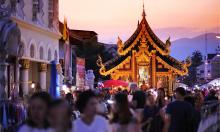Chiang Mai, Thailand
Human rights are widely conceived of as an almost self-explanatory social good, of which women’s rights are a part. What is not often considered is the work that goes into building these rights in practice, especially in conditions of conflict and oppressive states. Particularly obscured are the gender aspects of human rights violations, which can include direct violence against women and children as well as indirect violence. Of central importance is the leveraging of men’s and women’s identities in facilitating oppression by framing men primarily as actors and combatants and women as victims. During ten weeks on the Thailand-Myanmar border, this program considers the gender dimensions of conflict and oppression and the crucial work of local organizations in combatting human rights violations, with particular attention to gender and ethnicity.
Myanmar (often referred to by its former name of Burma) has been a highly oppressive and closed state where the military regime has held the country in isolation for nearly 70 years. It is also a highly diverse state with 135 recognized distinct ethnic groups struggling for autonomy against the Burmese military. The result of the repressive regime and protracted conflict has been mass displacement into the border areas and neighboring countries. In Thailand in particular, activist groups, including women’s organizations, have worked tirelessly for human rights, peace, livelihood support, and democracy from exile. Although in recent years a democratically elected government gained power and a peace process began, the processes of democratization and peacebuilding are slow and painstaking, and activism is more crucial as ever as change comes to the country.
This program explores the human rights, conflict, and the peacebuilding process in Myanmar by examining the dynamics of ethnicity, gender, and power on the Thailand-Myanmar border. Based primarily in Chiang Mai, Thailand, with a field trip to the border town of Mae Sot and the near border areas of Mae Ai and Chiang Rai, we will collaborate with several local organizations that work on social services, livelihood support, and human rights advocacy, including the Kachin Women’s Association Thailand and Burma Link, to learn about the complexity of what human rights activism looks like in practice.
Through an interdisciplinary curriculum comprised of literature, current events, ethnography, and creative nonfiction, as well as site visits to local community organizations and ethnic women’s groups, students will develop a better understanding of the ethnic and gender dynamics of migration, social movements, conflict, and peacebuilding.
During seven weeks in Chiang Mai, students will meet with peace activists, local and international nongovernmental organizations serving the population of people from Burma living in Thailand, and human rights organizations. Chiang Mai is a major hub of activism for people from Burma living in exile and is also a vibrant Thai city known for its arts and food. We will spend two weeks in Mae Sot, a town directly on the Thailand-Burma border and home to a huge number of migrants and refugees as well as nongovernmental organizations that serve the migrant and refugee communities. Here, students will develop a stronger sense of the border through our exploration of multiple sites, including the border itself, migrant schools, activist organizations, and possibly a refugee camp. We will also travel to Mai Ai, a town near the Thailand-Burma border and home to a large number of migrants. In Mai Ai, we will stay at a small-farm agroforestry research center and learn about the livelihood, gender, and citizenship work they do with ethnic minority migrant communities in Thailand. On our way back to Chiang Mai, we will spend a few days in a Palaung village near Chiang Dao. Here, students will learn about the challenges facing migrant communities in Thailand. On a separate excursion, we will also spend part of a week visiting a rural Lahu community in the mountains near Chiang Rai. Here students will develop a broader understanding of the many challenges that face migrant communities in Thailand and learn about the role of activism and civic engagement in protecting human rights and livelihood practices.
Coursework will consist of individual and group projects, classroom lecture and discussion, field excursions, site visits, individual analysis, and the development of an individual research project.
- CHID 474A: Nature and Society: Displacement, Resource Management, and Environmental Justice (5 credits I&S)
- CHID 474B: Ethnicity, History, and Intersectional Identities in Myanmar (5 credits I&S)
- CHID 474C: Human Rights, Social Movements, and Conflict Transformation (5 credits I&S)
*Note that the fees stated above do not include some additional costs, including, but not limited to: airfare, Study Abroad Insurance ($1.64/day), and personal spending money. Remember that these costs will differ by program. Be sure to read our Fees, Financing, and Withdrawal information for details about the fee structure and payment schedule.
